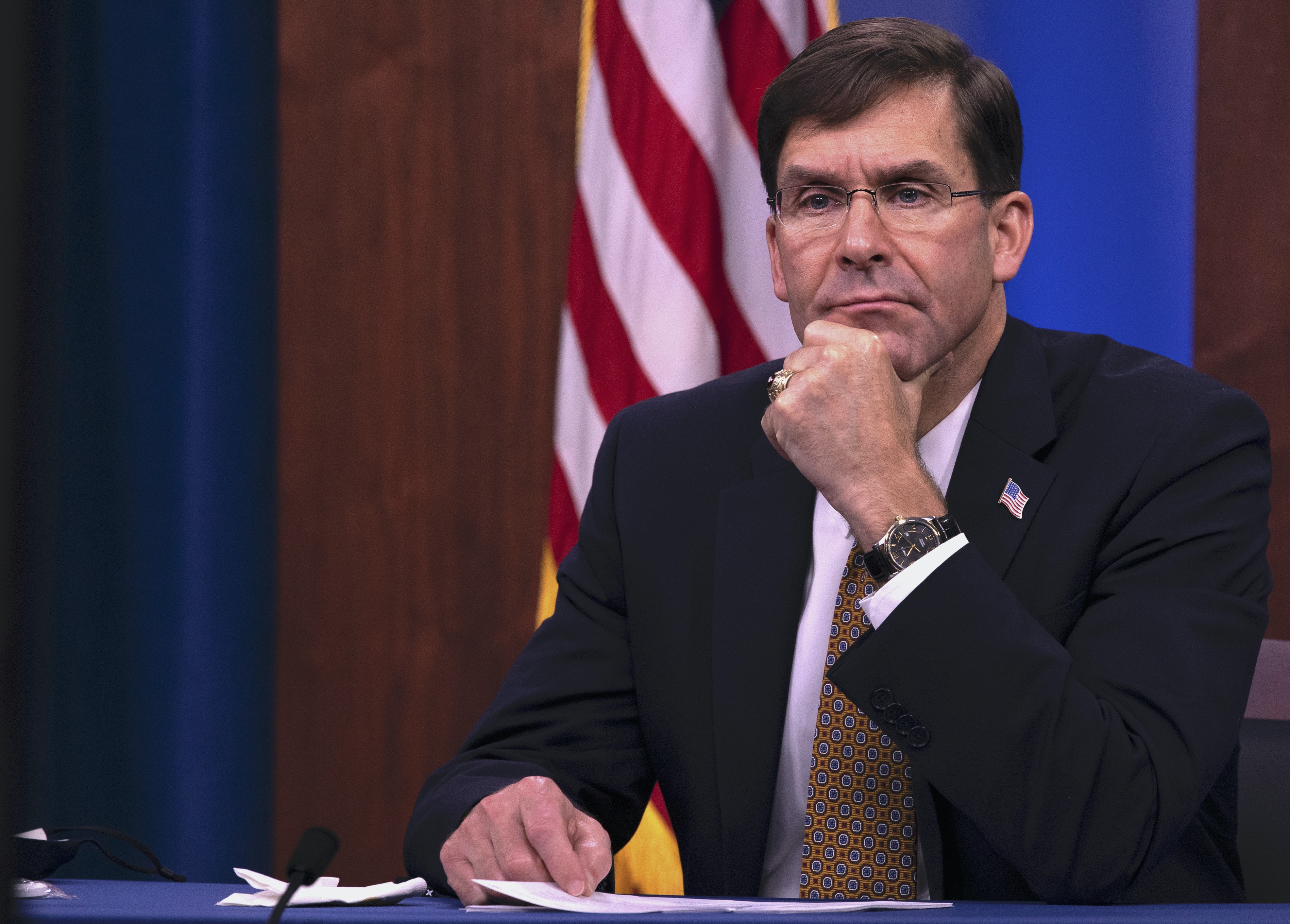
This post has been updated to include statements from lawmakers and a farewell memo from outgoing Defense Secretary Mark Esper.
President Trump announced the firing of Defense Secretary Mark Esper in a tweet on Monday.
Christopher Miller, who has been serving as the director of the National Counterterrorism Center, is the new acting defense secretary as the Trump administration heads into its final two months in office.
“I am pleased to announce that Christopher C. Miller, the highly respected Director of the National Counterterrorism Center (unanimously confirmed by the Senate), will be Acting Secretary of Defense, effective immediately…..Chris will do a GREAT job!” Trump wrote on Twitter. “Mark Esper has been terminated. I would like to thank him for his service.”
I am pleased to announce that Christopher C. Miller, the highly respected Director of the National Counterterrorism Center (unanimously confirmed by the Senate), will be Acting Secretary of Defense, effective immediately..
— Donald J. Trump (@realDonaldTrump) November 9, 2020
Esper’s ouster comes after Trump lost his bid for a second term to former Vice President Joe Biden, according to initial vote tabulations. The Associated Press and several news networks called the election for Biden on Saturday.
In a farewell note to the Defense Department, Esper touted both efforts to execute the National Defense Strategy and the Pentagon’s shipbuilding proposal for the Navy as accomplishments during his tenure.
“While I step aside knowing that there is much more we could accomplish together to advance America’s national security, there is much achieved in the time we had to improve the readiness, capabilities, and professionalism of the joint force, while fundamentally transforming and preparing it for the future,” Esper wrote in the Nov. 9 memo.
In the month leading up to the 2020 election, Esper made several public appearances touting the Pentagon’s work under the Trump administration, including the move to a new National Defense Strategy, focused on great power competition with countries like Russia and China.
During one such appearance in early October, Esper outlined a new Defense Department plan – known as Battle Force 2045 – to build a larger Navy. Esper’s proposal, which came months after his office rejected the Navy’s own fleet architecture plan, called for a fleet of more than 500 ships that would include both manned and unmanned vessels.
USNI News previously reported that the Office of the Secretary of Defense reached similar conclusions to that of the Navy in assessing the future naval architecture. But Esper’s decision that the Pentagon take over the Navy’s fleet analysis delayed the annual shipbuilding plan and placed an effective hold on the Integrated Naval Force Structure Assessment (INFSA) the Navy and Marine Corps had been pursuing. The delays angered lawmakers, who as of last month had not been provided the 30-year outlook or the Future Naval Force Study (FNFS) that influenced Battle Force 2045.
While the former defense secretary provided broad details of the plan in recent public speeches, the Pentagon has yet to publish documents to accompany Battle Force 2045 or details on how the Navy would both build and maintain a significantly bigger fleet.
Senate Armed Services Committee Chairman Sen. Jim Inhofe (R-Okla.) in a statement on Monday thanked Esper for serving in the administration and focusing on the Pentagon’s National Defense Strategy.
“I want to thank Secretary Esper for his service – for prioritizing implementation of the National Defense Strategy, for thinking critically about how the Pentagon operates, and for always putting our service members first,” Inhofe said. “I just spoke with Acting Secretary of Defense Miller, and I look forward to working with him to ensure that these priorities remain paramount and to working with President Trump to maintain stability at the Pentagon, particularly as we work to enact the 60th annual National Defense Authorization Act.”
Meanwhile, SASC Ranking Member Sen. Jack Reed (D-RI) said Trump’s dismal of Esper at the end of his term “undermines national security.”
“The President’s choice to fire Secretary Esper is a play for attention and is yet another example of President Trump putting his ego over the needs and security of our nation,” Reed said.
“Joe Biden is President-elect, and it’s past time for Republican leaders to step up and explain that reality to President Trump before he takes further rash and attention-seeking acts that damage America,” he added.
House Armed Services Committee Chairman Rep. Adam Smith (D-Wash.) also criticized Trump’s firing of Esper and argued the Defense Department needs “stable, experienced leadership” during the presidential transition.
“Dismissing politically appointed national security leaders during a transition is a destabilizing move that will only embolden our adversaries and put our country at greater risk. President Trump’s decision to fire Secretary Esper out of spite is not just childish, it’s also reckless,” Smith said. “It has long been clear that President Trump cares about loyalty above all else, often at the expense of competence, and during a period of presidential transition competence in government is of the utmost importance.”
Ranking Member Rep. Mac Thornberry (R-Texas), who is retiring in January, praised Esper for his time in the administration.
“Mark Esper has served the nation well under very challenging circumstances. He has helped lead the Department of Defense toward being more efficient and better prepared to deter peer adversaries,” Thornberry said. “He has been an effective advocate for the men and women in uniform and their families. He deserves the gratitude of every American.”
Esper, who began as the Army secretary under President Trump, assumed the top job at the Pentagon in July 2019 after former acting Defense Secretary Patrick Shanahan took himself out of the running to succeed James Mattis. Esper previously served as the Army secretary from November 2017 through July 2019.





